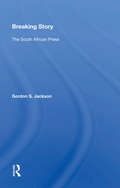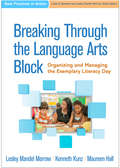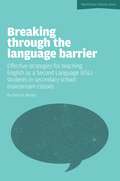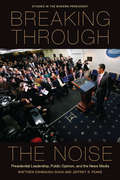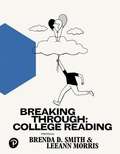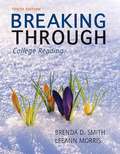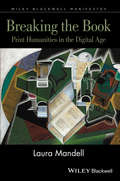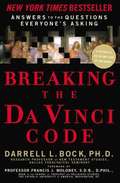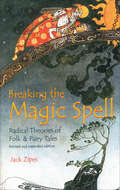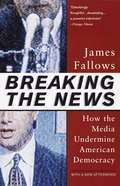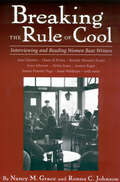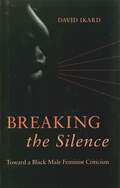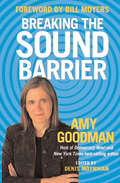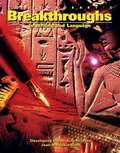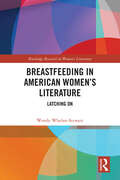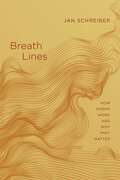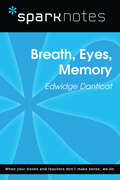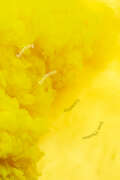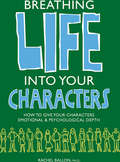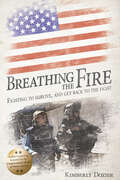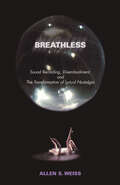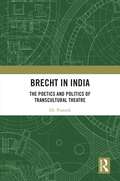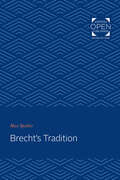- Table View
- List View
Breaking Story: The South African Press
by Gordon S. JacksonThis book provides an in-depth analysis of the economic difficulties facing journalism, including the impact of television's increasing share of the advertising market. It focuses on the alternative press, which arose in the mid-1980s at the height of the government's crackdown on dissent.
Breaking Through the Language Arts Block: Organizing and Managing the Exemplary Literacy Day (Best Practices in Action)
by Lesley Mandel Morrow Kenneth Kunz Maureen HallThis innovative book helps K–6 teachers infuse the entire school day with research-based literacy best practices. Classroom-tested strategies are presented for planning and implementing each component of the "exemplary literacy day"--vocabulary and word study sessions, literacy work stations, differentiated guided reading groups, reading and writing workshops, and interdisciplinary projects. Teachers get tips for organizing a print-rich classroom, supporting students' social–emotional well-being, and using assessment to guide instruction. User-friendly features include vivid vignettes, classroom management tips, questions for discussion and reflection, and 15 reproducible forms, checklists, and lesson templates. Purchasers get access to a Web page where they can download and print the reproducible materials in a convenient 8 1/2" x 11" size. Note: this book is a contemporary follow-up to Morrow's influential earlier title Organizing and Managing the Language Arts Block.
Breaking Through the Language Barrier: Effective Strategies for Teaching English as a Second Language (ESL) to Secondary School Students in Mainstream Classes
by Patricia MertinTeaching students for whom English is not their first language is a huge challenge for any educator. It is frustrating and demoralising for teachers and their students if the language barrier prevents learning and progress in the classroom. But, with ever increasing numbers of English as a Second Language (ESL) students in secondary schools - there is now a majority in international schools - teachers need to know how to overcome common problems and teach ESL students effectively. This concise and informative book provides strategies and practical advice that teachers can use every day in the classroom to help ESL students understand and get to grips with their subject. It includes advice on using the textbook, cultural differences, realistic timescales for learning, and language and grammar that is easy to understand; plus chapters on teaching specific subjects. Patricia Mertin is Mother Tongue co-ordinator at the International School of Dusseldorf and has vast experience of teaching ESL students.
Breaking Through the Language Barrier: Effective Strategies for Teaching English as a Second Language (ESL) to Secondary School Students in Mainstream Classes
by Patricia MertinTeaching students for whom English is not their first language is a huge challenge for any educator. It is frustrating and demoralising for teachers and their students if the language barrier prevents learning and progress in the classroom. But, with ever increasing numbers of English as a Second Language (ESL) students in secondary schools - there is now a majority in international schools - teachers need to know how to overcome common problems and teach ESL students effectively. This concise and informative book provides strategies and practical advice that teachers can use every day in the classroom to help ESL students understand and get to grips with their subject. It includes advice on using the textbook, cultural differences, realistic timescales for learning, and language and grammar that is easy to understand; plus chapters on teaching specific subjects. Patricia Mertin is Mother Tongue co-ordinator at the International School of Dusseldorf and has vast experience of teaching ESL students.
Breaking Through the Noise: Presidential Leadership, Public Opinion, and the News Media
by Matthew Eshbaugh-Soha Jeffrey S. PeakeModern presidents engage in public leadership through national television addresses, routine speechmaking, and by speaking to local audiences. With these strategies, presidents tend to influence the media's agenda. In fact, presidential leadership of the news media provides an important avenue for indirect presidential leadership of the public, the president's ultimate target audience. Although frequently left out of sophisticated treatments of the public presidency, the media are directly incorporated into this book's theoretical approach and analysis. The authors find that when the public expresses real concern about an issue, such as high unemployment, the president tends to be responsive. But when the president gives attention to an issue in which the public does not have a preexisting interest, he can expect, through the news media, to directly influence public opinion. Eshbaugh-Soha and Peake offer key insights on when presidents are likely to have their greatest leadership successes and demonstrate that presidents can indeed "break through the noise" of news coverage to lead the public agenda.
Breaking Through: College Reading
by Brenda D. Smith LeeAnn Morris<p>The comprehensive guide to reading, understanding, and retaining college-level material. <p>Breaking Through: College Reading – the lower-level book in the Smith/Morris two-book series – motivates readers and equips them with the skills necessary to achieve their academic and career goals. It emphasizes the building of prior knowledge, or schemata, one of the most critical elements in helping developing readers achieve. The use of actual college textbook passages also provides immediate modeling and opportunities to apply study and reading skills at a realistic level. <p>You’ll find that the 12th Edition upholds the philosophy and purpose of previous editions, but now in an even more contemporary way. It teaches effective reading techniques; offers extensive practice within the pages and online; provides independent, partner, and group activities; and engages learners with various reading selections that are pertinent to the college community.</p>
Breaking Through: College Reading (Tenth Edition)
by Brenda D. Smith Deborah Deutsch Smith Leeann MorrisBreaking Through provides instruction and practice on the reading and study skills necessary for successful independent college learning by providing a high volume of actual college textbook and academic selections for application opportunities. The use of actual college textbook passages offers immediate modeling and application of college study and reading skills at a realistic level. Students apply the skill being taught to reading short textbook passages and then go on to use multiple skills on the longer selections that conclude most chapters.
Breaking the Book
by Laura MandellBreaking the Book is a manifesto on the cognitive consequences and emotional effects of human interactions with physical books that reveals why the traditional humanities disciplines are resistant to 'digital' humanities. Explores the reasons why the traditional humanities disciplines are resistant to 'digital humanities' Reveals facets of book history, offering it as an example of how different media shape our modes of thinking and feeling Gathers together the most important book history and literary criticism concerning the hundred years leading up to the early 19th-century emergence of mass print culture Predicts effects of the digital revolution on disciplinarity, expertise, and the institutional restructuring of the humanities
Breaking the Book: Print Humanities in the Digital Age (Wiley-Blackwell Manifestos)
by Laura MandellBreaking the Book is a manifesto on the cognitive consequences and emotional effects of human interactions with physical books that reveals why the traditional humanities disciplines are resistant to 'digital' humanities. Explores the reasons why the traditional humanities disciplines are resistant to 'digital humanities' Reveals facets of book history, offering it as an example of how different media shape our modes of thinking and feeling Gathers together the most important book history and literary criticism concerning the hundred years leading up to the early 19th-century emergence of mass print culture Predicts effects of the digital revolution on disciplinarity, expertise, and the institutional restructuring of the humanities
Breaking the Da Vinci Code
by Darrell L. BockBreaking the Da Vinci Code is a must-read for anyone who wants to understand the pernicious nature of The Da Vinci Code. Darrell Bock shines the light of history on Dan Brown's conspiracy theories and turns up a mixture of fascinating possibilities, wishful thinking, overblown claims, and outright errors. But more importantly, he reveals the book's hidden agenda: to transform the very character of the Christian faith.
Breaking the Magic Spell: Radical Theories of Folk & Fairy Tales
by Jack Zipes“Zipes ably demonstrates that moral, political, religious, and other ideologies have shaped these apparently innocent narratives.” —Lore and LanguageThis revised, expanded, and updated edition of the 1979 landmark Breaking the Magic Spell examines the enduring power of fairy tales and the ways they invade our subjective world. In seven provocative essays, Zipes discusses the importance of investigating oral folk tales in their socio-political context and traces their evolution into literary fairy tales, a metamorphosis that often diminished the ideology of the original narrative. Zipes also looks at how folk tales influence our popular beliefs and the ways they have been exploited by a corporate media network intent on regulating the mystical elements of the stories. He examines a range of authors, including the Brothers Grimm, Hans Christian Anderson, Ernst Bloch, Tolkien, Bettelheim, and J.K. Rowling to demonstrate the continuing symbiotic relationship between folklore and literature.“The name Jack Zipes is synonymous with highly regarded and widely read anthologies and critiques of fairy tales.” —Choice“Fairy Tales are a highly fashionable study today for literary scholars as well as folklorists, and another new book shows what a range of interest can be evoked by them. This time in Jack Zipes’ interesting and vigorous study.” —Encounter“Places traditional tales in their socio-political, economic and cultural contexts.” —Teacher Librarian“Zipes reveals the extraordinary breadth of his acquaintance with both recent and classic literature in the field of folk and fairytale research.” —Fabula“Zipes manages the impressive trick of communicating both detail and overview without simplifying either . . . the serious folklorist should definitely have this on his bookshelf.” —Fortean Times
Breaking the News: How the Media Undermine American Democracy
by James M. FallowsWhy do Americans mistrust the news media? It may be because show like "The McLaughlin Group" reduce participating journalists to so many shouting heads. Or because, increasingly, the profession treats issues as complex as health-care reform and foreign policy as exercises in political gamesmanship. These are just a few of the arguments that have made Breaking the News so controversial and so widely acclaimed. Drawing on his own experience as a National Book Award-winning journalist--and on the gaffes of colleagues from George Will to Cokie Roberts--Fallows shows why the media have not only lost our respect but alienated us from our public life. "Important and lucid... It moves smartly beyond the usual attacks on sensationalism and bias to the more profound problems in modern American journalism... dead-on."--Newsweek
Breaking the Rule of Cool: Interviewing and Reading Women Beat Writers
by Nancy M. Grace Ronna C. JohnsonThe Beat movement nurtured many female dissidents and artists who contributed to Beat culture and connected the Beats with the second wave of the women’s movement. Although they have often been eclipsed by the men of the Beat Generation, the women’s contributions to Beat literature are considerable. Covering writers from the beginning of the movement in the 1950s and extending to the present, this book features interviews with nine of the best-known women Beat writers, including Diane di Prima, ruth weiss, Joyce Johnson, Hettie Jones, Joanne Kyger, Brenda Frazer (Bonnie Bremser), Janine Pommy Vega, Anne Waldman, and the critic Ann Charters. Each writer is presented by a biographical essay that details her literary or scholarly accomplishments. In these recent interviews the nine writers recall their lives in Beat bohemia and discuss their artistic practices. Nancy M. Grace outlines the goals and revelations of the interviews, and introduces the community of female Beat writers created in their conversations with the authors. Although they have not received attention equal to the men, women Beat writers rebelled against mainstream roles for young women and were exuberant participants in creating the Beat scene. Mapping their unique identities in the Beat movement, Ronna C. Johnson shows how their poetry, fiction, and memoirs broke the male rule that defined Beat women as silent bohemian “chicks” rather than artistic peers. Breaking the Rule of Cool combines the interviews with literary criticism and biography to illustrate the vivacity and intensity of women Beat writers, and argues that American literature was revitalized as much by the women’s work as by that of their male counterparts.
Breaking the Silence: Toward a Black Male Feminist Criticism
by David IkardCan black males offer useful insights on black women and patriarchy? Many black feminists are doubtful. Their skepticism derives in part from a history of explosive encounters with black men who blamed feminism for stigmatizing black men and undermining racial solidarity and in part from a perception that black male feminists are opportunists capitalizing on the current popularity of black women's writing and criticism. In Breaking the Silence, David Ikard goes boldly to the crux of this debate through a series of provocative readings of key African American texts that demonstrate the possibility and value of a viable black male feminist perspective.Seeking to advance the primary objectives of black feminism, Ikard provides literary models from Chester Himes's If He Hollers Let Him Go, James Baldwin's Go Tell It on the Mountain, Toni Morrison's Paradise, Toni Cade Bambara's The Salt Eaters, and Walter Mosley's Always Outnumbered, Always Outgunned and Walkin' the Dog that consciously wrestle with the concept of victim status for black men and women. He looks at how complicity across gender lines, far from rooting out patriarchy in the black community, has allowed it to thrive. This complicity, Ikard explains, is a process by which victimized groups invest in victim status to the point that they unintentionally concede power to their victimizers and engage in patterns of behavior that are perceived as revolutionary but actually reinforce the status quo.While black feminism has fostered important and necessary discussions regarding the problems of patriarchy within the black community, little attention has been paid to the intersecting dynamics of complicity. By laying bare the nexus between victim status and complicity in oppression, Breaking the Silence charts a new direction for conceptualizing black women's complex humanity and provides the foundations for more expansive feminist approaches to resolving intraracial gender conflicts.
Breaking the Sound Barrier
by Amy GoodmanThe host of Democracy Now! breaks through the corporate media&’s lies, sound bites, and silence in this New York Times–bestselling collection of articles. In place of the usual suspects—the &“experts&” who, in Amy Goodman&’s words, &“know so little about so much, explain the world to us, and get it so wrong&”—this accessible, lively collection allows the voices the corporate media exclude and ignore to be heard loud and clear. From community organizers in New Orleans, to the courageous American soldiers who&’ve said &“no&” to Washington&’s wars, to victims of torture and police violence, we are given the extraordinary opportunity to hear ordinary people standing up and speaking out. Written with all of the fierce intelligence and passion for truth that millions have come to expect from Amy Goodman&’s reportage, Breaking the Sound Barrier proves the power that independent journalism can have in the struggle for a better world, one in which ordinary citizens are the true experts of their own lives and communities. Praise for Amy Goodman and Breaking the Sound Barrier &“Amy Goodman has taken investigative journalism to new heights.&” —Noam Chomsky, leading public intellectual and author of Hopes and Prospects &“Amy, as you will discover on every page of this book, knows the critical question for journalists is how close they are to the truth, not how close they are to power.&” —From the foreword by Bill Moyers, author of Moyers on America &“What journalism should be: beholden to the interests of people, not power and profit.&” —Arundhati Roy, author of The End of Imagination &“Those unfamiliar with Goodman&’s work will discover a bold voice that refuses to mince words regardless of the topic or target, along with a wealth of behind-the-headlines reporting.&” —Publishers Weekly
Breakthroughs in Writing and Language (Breakthroughs Series)
by Joan Maruskin-Mott<P>"Contemporary's Breakthroughs in Writing and Language is designed to help students develop a firm basis in writing and language skills. Both the process of writing and conventions of English are covered. In particular, there are three features to note: <P>- The ""Journal Writing"" feature provides students with a variety of ideas for writing in their journals. Its main purpose is to help students start to feel comfortable as writers. In this section only, grammar and spelling are not emphasized. <P>- ""Putting Your Skills to Work,"" a highly structured writing activity, appears following language skills exercises. The writing focuses on the grammar point that was just taught. This feature helps students to understand grammar in the context of their own writing. <P>- Somewhat less structured than ""Putting Your Skills to Work,"" ""Your Turn to Write"" gives students a choice of topics and some suggestions about how to approach the topic. ""Your Turn to Write"" is followed by a checklist of a few of the major grammar and usage points in the chapter. The checklist guides students in editing their own writing."
Breastfeeding in American Women’s Literature: Latching On (Routledge Research in Women's Literature)
by Wendy Whelan-StewartRather than rarities, literary depictions of women breastfeeding infants are more common in American literature than recognized. In some cases, readers have dismissed such portrayals as scenic background or strokes of verisimilitude. In other cases, we have failed to register them at all. By cataloging and closely reading scenes of characters breastfeeding across the nineteenth, twentieth, and twenty-first centuries, this book decodes the beliefs of writers as celebrated as Willa Cather, Toni Morrison, and Louise Erdrich and as current as Camille Dungy, Maggie Nelson, and Torrey Peters. It traces in these authors’ fantasies and fears the consistent and sometimes competing cultural ideologies that accrue over decades and find expression in breastfeeding scenes. Despite the different historical and cultural expectations of what a mother should be and do, twentieth and twenty-first-century women writers have consistently singled out maternal pleasure—a mother’s privileging of her own desire—as the most important theme attending scenes of breastfeeding.
Breath Lines: How Poems Work and Why They Matter
by Jan SchreiberBreath Lines takes a fresh and down-to-earth approach to encounters with poetry. In these accessible, non-technical essays, Jan Schreiber offers insightful strategies for reading and understanding works that many people have found challenging. The essays address critical areas of poetic craft and interpretation: the content of poems, including narrative techniques and the voices a poet creates; the character and power of verse lines and the problems attending the translation of metrical poems; challenges of interpretation, including complex philosophies and obscure references; and a look at the future of the art, hinted by the competing styles and allegiances of contemporary writers. Each essay offers pertinent verse examples to illustrate metrical, rhetorical, and stylistic issues. Schreiber’s commentaries explain how a reader’s careful attention can be rewarded with a deeper understanding of the multiple meanings embedded in apparently simple poems—and how readers can thereby experience an emotional impact not always perceived on a first reading. Designed for writers, students, and passionate readers, Breath Lines: How Poems Work and Why They Matter offers guidance into some of the art form’s more arcane mysteries, written by a distinguished poet and critic.
Breath, Eyes, Memory (SparkNotes Literature Guide Series)
by SparkNotesBreath, Eyes, Memory (SparkNotes Literature Guide) by Edwidge Danticat Making the reading experience fun! Created by Harvard students for students everywhere, SparkNotes is a new breed of study guide: smarter, better, faster.Geared to what today's students need to know, SparkNotes provides:chapter-by-chapter analysis explanations of key themes, motifs, and symbols a review quiz and essay topicsLively and accessible, these guides are perfect for late-night studying and writing papers.
Breathing Aesthetics
by Jean-Thomas TremblayIn Breathing Aesthetics Jean-Thomas Tremblay argues that difficult breathing indexes the uneven distribution of risk in a contemporary era marked by the increasing contamination, weaponization, and monetization of air. Tremblay shows how biopolitical and necropolitical forces tied to the continuation of extractive capitalism, imperialism, and structural racism are embodied and experienced through respiration. They identify responses to the crisis in breathing in aesthetic practices ranging from the film work of Cuban American artist Ana Mendieta to the disability diaries of Bob Flanagan, to the Black queer speculative fiction of Renee Gladman. In readings of these and other minoritarian works of experimental film, endurance performance, ecopoetics, and cinema-vérité, Tremblay contends that articulations of survival now depend on the management and dispersal of respiratory hazards. In so doing, they reveal how an aesthetic attention to breathing generates historically, culturally, and environmentally situated tactics and strategies for living under precarity.
Breathing Life into Your Characters: How to Give You Characters Emotional and Psychological Depth
by Rachel BallonIt's the question that eternally plagues all good writers: How can you describe the thoughts and feelings of characters who have backgrounds or psychological aberrations with which you have no personal experience? How can you describe the feelings of a drug addict if you've never been one? How can you write about being a prisoner if you've never been to jail? You can do all the research you want, but the question still remains: How do you convincingly portray characters if you've never lived in their skin? In Breathing Life Into Your Characters, writing consultant and professional psychotherapist Rachel Ballon, Ph.D., shows you how to get in touch with the thoughts and feelings necessary to truly understand your characters, no matter what their background or life experiences. She'll show you how to: Develop a psychological profile for every character; Turn archetypes into conflicted characters; Think like a criminal to convincingly write one; Reveal personalities through the use of nonverbal communication. In addition, you'll learn how to effectively use Ballon's "Method Writing" system, taught previously only in her writing workshops, to explore your own feelings, memories, and emotions to create characters of astonishing depth and complexity!
Breathing the Fire: Fighting to Survive, and Get Back to the Fight
by Kimberly Dozier&“A harrowing tale of courage, survival, determination, fellowship and the high price of covering a war . . . a master storyteller and one tough journalist.&” —Tom BrokawCBS Foreign Correspondent Kimberly Dozier shares her compelling story from being injured in Iraq to her recovery . . . shedding light on the ordeal faced by countless combat veterans and civilians. In a flash, Kimberly Dozier&’s life changed. As an award-winning CBS News reporter, Dozier had devoted her career to being in the right place at the right time to capture the story. Suddenly, in the wrong place at the worst time, she became the story, as a deadly explosion tore through her team and the troops they were following, and a word spread worldwide. That Memorial Day in 2006, a routine mission ended with Dozier in a pool of blood on a Baghdad street, a victim of a car bomb that killed her team, cameraman Paul Douglas and soundman James Brolan, as well as U.S. Army Captain James Alex Funkhouser and his translator. Critically injured, Dozier woke to find herself fighting first for survival, then for recovery, and finally to return to the field. Breathing the Fire tracks one woman&’s relentless determination to get the story, to get it right, and to get well again after everything went wrong. The paperback was produced at the request of hospital caregivers, who find the book helps trauma patients and the families supporting them. The author&’s profits go to wounded warrior charities.&“A rare, personal view—with all the attention to detail a great reporter brings to bear—into an experience shared by thousands of wounded Iraq veterans.&” —Dan Rather
Breathless: Sound Recording, Disembodiment, and The Transformation of Lyrical Nostalgia
by Allen S. WeissExplores how early radio and sound recording influenced modernist literature.Breathless explores early sound recording and the literature that both foreshadowed its invention and was contemporaneous with its early years, revealing the broad influence of this new technology at the very origins of Modernism. Through close readings of works by Edgar Allan Poe, Stéphane Mallarmé, Charles Cros, Paul Valéry, Villiers de L'Isle-Adam, Jules Verne, and Antonin Artaud, Allen S. Weiss shows how sound recording's uncanny confluence of human and machine would transform our expectations of mourning and melancholia, transfiguring our intimate relation to death. Interdisciplinary, the book bridges poetry and literature, theology and metaphysics. As Breathless shows, the symbolic and practical roles of poetry and technology were transformed as new forms of nostalgia and eroticism arose.
Brecht in India: The Poetics and Politics of Transcultural Theatre
by PrateekBrecht in India analyses the dramaturgy and theatrical practices of the German playwright Bertolt Brecht in post-independence India. The book explores how post-independence Indian drama is an instance of a cultural palimpsest, a site celebrating a dialogue between Western and Indian theatrical traditions, rather than a homogenous and isolated canon. Analysing the dissemination of a selection of Brecht’s plays in the Hindi belt between the 1960s and the 1990s, this study demonstrates that Brecht’s work provided aesthetic and ideological paradigms to modern Hindi playwrights, helping them develop and stage a national identity. The book also traces how the reception of Brecht was mediated in India, how it helped post-independence Indian playwrights formulate a political theatre, and how the dissemination of Brechtian aesthetics in India addressed the anxiety related to the stasis in Brechtian theatre in Europe. Tracking the dialogue between Brechtian aesthetics in India and Europe and a history of deliberate cultural resistance, Brecht in India is an invaluable resource for academics and students of theatre studies and theatre historiography, as well as scholars of post-colonial history and literature.
Brecht's Tradition
by Max SpalterOriginally published in 1967. Literary scholars often acknowledge that Brecht borrowed from a variety of traditions, including Goethe, Schiller, expressionists, naturalists, and realists, all of whom affected his work. However, they tend not to address any single tradition as exclusively Brecht's. From these various literary traditions, Brecht borrowed formal elements only; compared with other writers to whom he is indebted, Brecht exceeds them in cynicism. They do not convey anything like his pitiless debunking attitude, his corrosive anti-romanticism, his hardheaded refusal to idealize or glorify, and his suspicion of all sentimentalities. This book discusses what the author identifies as the "Brechtian sensibility." Chroniclers of drama have not totally ignored the Brechtian tradition, but too often they are content to note merely that Brecht shared with some writers—particularly Büchner and Wedekind—a proclivity for open drama and episodes of racy realism tinged with poetic feeling. Other critics have not closely studied the various plays of this tradition in order to show how they constitute a distinctive and well-defined species of theater to which Brecht unmistakably belongs.
